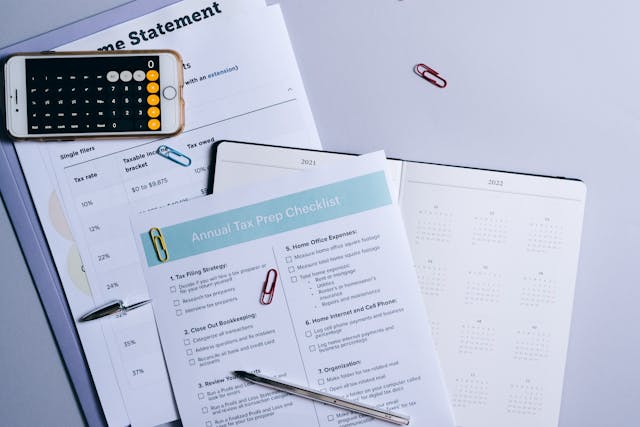Year-End Accounting Checklist: Important Financial Tasks to Complete
As the year draws to a close, small business owners across the USA must turn their attention to crucial year-end accounting tasks. Completing these tasks ensures that businesses maintain financial health, comply with tax regulations, and prepare for the upcoming year. Whether you handle your own accounting or rely on accounting services for small business in USA, this checklist will help streamline your process and ensure you don’t miss anything important.
1. Review Your Financial Statements
A key first step in the year-end process is reviewing your financial statements. This includes:
- Balance Sheet: Check for any discrepancies in assets, liabilities, and equity. Ensure that all accounts are accurate and up to date.
- Income Statement (Profit & Loss): Confirm that all revenue and expenses are accounted for. This statement will be crucial for tax preparation, so ensure that it reflects your business’s performance accurately.
- Cash Flow Statement: Make sure that all cash inflows and outflows are correctly recorded, as this will give you insight into your liquidity and financial health.
By ensuring these statements are accurate, you can avoid any errors or discrepancies during the tax season and be ready for discussions with your accountant.
2. Ensure Compliance with Tax Regulations
Proper tax planning is essential for small businesses. To make sure you’re fully prepared for filing your taxes, follow these key steps:
- Review Tax Deductions and Credits: Make sure you’ve taken full advantage of all available tax credits and deductions. These can include equipment depreciation, business expenses, and payroll tax credits. Consult with an accountant or tax advisor to ensure you’ve captured everything.
- 1099 and W-2 Forms: If you’ve hired contractors, ensure you’ve completed the 1099 forms for them. Similarly, ensure W-2s are ready for your employees.
- Tax Payments: Check if you’ve made any quarterly estimated tax payments and that they match your records. You don’t want to be caught off guard with outstanding payments when it’s time to file.
Keeping on top of tax compliance not only helps avoid penalties but also ensures you are maximizing your savings come tax time.
3. Reconcile Bank and Credit Card Accounts
Before closing the books for the year, it’s critical to reconcile all bank and credit card accounts. This process ensures that:
- Your recorded balances match the statements provided by your bank and credit card companies.
- Any discrepancies are identified and resolved quickly.
- Your business’s financial data is accurate for tax reporting.
Many small businesses use accounting services for small business in USA to ensure this step is completed properly, especially when there are multiple accounts to reconcile. The reconciliation process can be time-consuming, but it is essential to ensuring the integrity of your financial data.
4. Assess Your Inventory and Assets
If your business deals with physical products, conducting an inventory count at year-end is crucial. Here’s what you need to do:
- Count Inventory: Verify the inventory on hand at year-end, and make adjustments for any shrinkage, damage, or obsolete stock.
- Record Asset Depreciation: Ensure that all assets—such as equipment, vehicles, and real estate—are properly depreciated according to IRS guidelines. This could also impact your tax deductions and liabilities.
Keeping accurate records of your inventory and assets ensures that you don’t overstate or understate your business’s value, which can affect tax filings and overall financial health.
5. Plan for the Upcoming Year
The end of the year is a great time to set your business up for success in the next 12 months. Start by:
- Setting New Financial Goals: Review your financial performance and set new goals for revenue, profit margins, and cost management. This will guide your financial strategy for the new year.
- Budgeting: Establish a budget based on your expected income and expenses for the year. This helps with cash flow planning and managing unexpected costs.
- Employee Bonuses and Benefits: If you plan to distribute end-of-year bonuses, now’s the time to factor them into your budget. Also, ensure that employee benefits, such as health insurance, are updated.
Proper planning for the year ahead ensures that you start strong, maintain financial discipline, and stay on track to meet your business’s goals.
6. Seek Professional Small Business Bookkeeping Services
While many business owners handle their own accounting, it may be beneficial to hire small business bookkeeping services in USA to ensure that your year-end accounting is done correctly. Professional bookkeeping services provide:
- Expertise in managing complex accounting tasks.
- Help in preparing financial statements and reconciling accounts.
- Support with tax filings and ensuring compliance with local, state, and federal tax regulations.
By outsourcing your bookkeeping, you can save time, avoid costly mistakes, and ensure that your business is well-prepared for the year ahead.
7. Review Employee Payroll
Ensure that your payroll records are accurate before closing the year. This includes:
- Payroll Tax Filings: Ensure that all payroll taxes (federal, state, and local) are properly filed and paid.
- Employee Benefits: Review any changes in employee benefits, such as retirement contributions and insurance premiums.
- Year-End Bonuses: If you plan to provide year-end bonuses, ensure they are included in your payroll processing.
A thorough review of your payroll system ensures that both you and your employees are compliant with tax obligations and that any compensation adjustments are correctly processed.
8. Back-Up and Secure Financial Data
Data security should be a priority for every small business. Ensure that all of your financial data is backed up and properly stored. With the increasing threat of cyberattacks, businesses must protect sensitive financial information. Here’s how:
- Secure Backups: Use cloud services or external drives to back up your financial data regularly.
- Access Control: Limit access to financial records to only authorized personnel to reduce the risk of data breaches.
By protecting your business’s financial data, you safeguard against potential threats that could disrupt your operations or result in financial losses.
Conclusion
Completing your year-end accounting checklist isn’t just about closing the books for the year—it’s about setting your business up for continued success. By reviewing financial statements, reconciling accounts, and preparing for taxes, you ensure that your business stays financially healthy and compliant. Whether you choose to handle these tasks yourself or rely on professional accounting services for small business in USA, taking the time to complete these steps will provide you with peace of mind and set a solid foundation for the year ahead.






